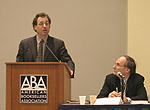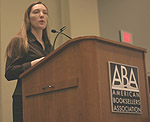- Categories:
Local Business Organizers Encourage Booksellers to Build Community Efforts
Booksellers attending the panel on local business alliances -- "Shop Local: Forming Business Alliances in Your Community" -- on Thursday, May 18, at BookExpo America heard from three seasoned organizers on behalf of local businesses who encouraged them to strengthen their efforts on behalf of both their individual businesses and their communities.
All of the panelists cited the significant challenges facing independent businesses nationwide. Michael H. Shuman, vice president for enterprise development for Training & Development Corporation said that on both the local and national levels more than $100 billion "of pork going the wrong way" was spent in efforts to either attract or retain "non-local businesses." Shuman is the author of The Small-Mart Revolution: How Local Businesses Are Beating the Global Competition (Berrett-Koehler).
Because independently owned, local businesses "get almost none of the equity financing in the country," Shuman said, "it is extremely difficult for any one business on its own to create a 'small-mart revolution.'" However, Betsy Burton of The King's English in Salt Lake City noted, "You have an enormous amount of clout in your community collectively." Moderator Oren Teicher, ABA COO, stressed the importance of the discussion when he told the approximately 70 booksellers that forming an alliance of locally owned, independent businesses "is perhaps the single most important thing you can do to develop your business."
 Michael H. Shuman, vice president for enterprise development for Training & Development Corporation, and ABA COO Oren Teicher (seated). |
Shuman said, "I am fairly optimistic about the way things could go" with a concerted effort on the part of independent businesses. And Stacy Mitchell, senior researcher for the Institute for Local Self-Reliance, pointed to some heartening statistics indicating that there were 400 more independently owned pharmacies in 2006 than in the previous year and that the independent bookstore market share was showing modest gains over recent years. Mitchell is the author of The Home Town Advantage: How to Defend Your Main Street Against Chain Stores ... and Why It Matters (ILSR) and the Big-Box Swindle: The True Cost of Mega-Retailers and the Fight for America's Independent Businesses, which will be published in November by Beacon.
The key, the panelists said, is to work with other independent businesses in establishing local business alliances. Burton said that participating in an active local independent alliance "can do more for your bottom line than any Lemony Snicket or J.K. Rowling." Burton is one of the founders of Local First in Utah, a campaign to encourage residents of the state to patronize locally owned businesses. The group organized a statewide "Buy Local First Week" last fall, and in its first year the campaign included approximately 500 businesses. Burton said the campaign generated "over $200,000 worth of publicity" and that her store's business was up 20 percent last November and 10 percent in December -- something she attributed in large part to the power of Local First.
The keys to establishing a successful local retail alliance, said the panelists, are recognizing the many resources available and a willingness to play a leadership role. The panelists encouraged booksellers to turn to such organizations as the American Independent Business Alliance (AMIBA) , the Business Alliance for Local Living Economies (BALLE) , and The New Rules Project, which offer a wide range of information and support. Also, they urged booksellers to tap into the experience of existing local business alliances and to readily re-purpose their ideas and marketing materials.
"The key is to not reinvent the wheel," said Teicher.
 Stacy Mitchell, senior researcher for the Institute for Local Self-Reliance and author of the forthcoming Big-Box Swindle. |
Booksellers have a unique role to play in leadership, Burton said. As independent bookstores grow in importance as community centers, other small businesses and customers look to booksellers for leadership. The involvement of independent bookstores "only underscores your place at the heart of the community." Mitchell noted that a Buy Local campaign that trumpets "a message of economic self-reliance and community self-determination [will appeal] to people's deeper aspirations" by showing how their decisions can help foster the "local, healthy, independent communities we all want to live in." Mitchell related that the "Think Local, Be Local, Buy Local" business alliance, established in Northwest Washington three years ago, has created such a high level of consumer awareness that members "are routinely getting calls asking if they are locally owned."
A key message to convey, said Burton, is that "the difference between us and the chains is enormous" in the amount of money returned to the local community. All the panelists noted that corporate chain stores actually siphon money out of a community, as approximately 70 percent of the dollars spent in an independently owned retail business remains in the local economy, versus only about 30 percent spent in a chain store. Mitchell also spoke of "the hidden costs" of retail chains, citing studies that have shown superstores eliminate more jobs in a community than they create and that communities see, on average, a net loss of 180 jobs and $2 million in the local payroll. She said studies have shown that communities characterized by locally owned businesses have a lower crime rate and a higher rate of civic activities, including voter turnout and participation in organizations such as local school boards.
These economic facts garner political respect. Burton told the audience that meetings between Utah's Buy Local campaign and elected officials have been productive. Since incorporating as a 501c3 nonprofit organization, the campaign has received approximately $60,000 in state and local funding for its "educational mission."
Shop Local success stories are spreading: More than 36 local business alliances were founded over the past five years, said Mitchell, and the Austin Independent Business Alliance -- co-founded in 2002 by Steve Bercu of BookPeople in Austin, Texas -- has grown to "collectively [become] the city's fifth largest employer." --Dan Cullen
For more information about the locally owned business impact studies and links to related organizations, click here.

